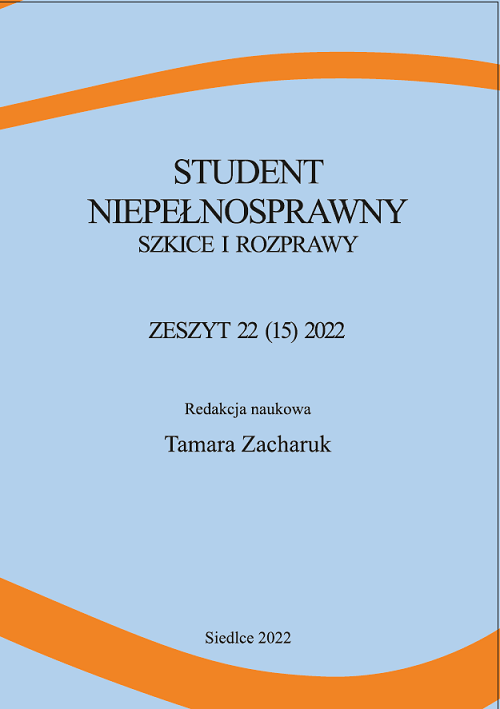Evolution of teachers’ views on remote education of children with special educational needs in the time of the COVID-19 epidemic in the perspective of crisis theory
DOI:
https://doi.org/10.34739/sn.2022.22.11Keywords:
teacher, distance learning, crisis, COVID-19 epidemicAbstract
The purpose of the epistemological research was to find out about changes in teachers' views on remote work with a student with special educational needs during the COVID-19 epidemic. The practical goal was to formulate recommendations for the organization of pedagogical work in the future, because crises are a feature of postmodern times. The teachers reacted typical of a crisis situation. Initially, they feared that education would be impossible and that the students themselves would gain nothing. They saw the difficulties. After a period of peculiar overpowering, they adapted to new conditions with their novelty. They have shown creativity potential. They have gone from bias to competency development. Remote education has exposed gaps in school preparation in terms of hardware equipment. She revealed the dangers of depriving children of psychological support and loneliness. The integration of activities of all educational entities – teachers, parents, and students – was of fundamental importance. The curriculum was implemented. The competences of parents, teachers, and students were developed in difficult conditions. This work took the form of an unplanned, wide-ranging pedagogical experiment forced by life. The importance and variety of functions of the school and the teacher were realized.
Downloads
References
Bandura A. (1997), Self-Efficacy, „Harvard Mental Health Letter”, 13 (9), pp. 4-6.
Bandura A. et al. (2001), Self-efficacy beliefs as shapers of children’s aspirations and career trajectories, Child Develop. 72 (1), pp. 187–207.
Bashe P.R., Kirby B.L. (2001), The OASIS guide to Asperger syndrome, advice, support, insights and inspiration, Crown Publishers, New York.
Bruch H., Sumatra G. (2006), Efektywne zarządzanie. Jak skutecznie podejmować decyzje, budować strukturę firmy i wykorzystywać czas, WUJ, Kraków.
Chomicki M. (2020), Psychospołeczne aspekty pracy zdalnej. Wyniki badań przeprowadzonych w trakcie trwania pandemii COVID-19, „Zeszyty Naukowe. Uniwersytet Eko-nomiczny w Krakowie”, nr 3, s. 31-44.
Dickinson H., Yates S. (2020), More than isolated: The experience of children and young people with disability and their families during the COVID-19 pandemic. Report on CYDA’s 2020 COVID-19 (Coronavirus) and children and young people with disability, online: https://www.cyda.org.au/images/pdf/covid_report_ compressed_1.pdf, data dostępu: 13.03.2021.
Dolot A. (2020), Wpływ pandemii COVID-19 na pracę zdalną – perspektywa pracownika, „E-mentor”, 1(83), s. 35-43, DOI: https://doi.org/10.15219/em83.1456.
Griffin R.W. (2005), Podstawy zarządzania organizacjami., Wydawnictwo Naukowe PWN, Warszawa 2005.
Jasperneite J., (2012) Was hinter Begriffen wie Industrie 4.0,steckt in „Computer & Automation“, 19 December 2012, https://publica.fraunhofer.de/entities/publication/ e9848c61-498a-4800-b7a7-819781cfc406/details, accessed on 23 December 2020.
Jasperneite J. (2012), Was hinter Begriffen wie Industrie 4.0 steckt, „Computer & Automation”, 19 grudnia, https://zeszytyhumanitas.pl/resources/html/article/details?id= 206142&language=en, data dostępu: 21.01.2021.
Kagermann H., Wahlster W., Helbig J. (eds) (2013), Recommendations for implementing the strategic initiative Industrie 4.0: Final report of the Industrie 4.0 Working Group, Forschungsunion, acatech.
Kocejko M. (2021), Sytuacja dzieci z niepełnosprawnościami w czasie pandemii COVID-19 – analiza intersekcjonalna, „Dziecko Krzywdzone. Teoria, Badania, Praktyka”, Vol. 20, nr 2, s. 76-91.
Kosińska E. (1999), Dyrektor w szkole: krótki poradnik psychologiczny, Wydawnictwo Rubikon, Kraków.
Majewska-Opiełka I. (1998), Umysł lidera: Jak kierować ludźmi u progu XXI wieku?, Warszawa, Andrzej Kalisz (rec.), „Problemy Opiekuńczo-Wychowawcze” 2004, nr 1, s. 50-52.
Maruszewski T. (1967), Mechanizmy radzenia sobie ze stresem a samoocena i poziom lęku, Przegląd. Psychol., 19 (3).
Maruszewski T. (1981), Mechanizmy zwalczania stresu egzaminacyjnego i ich indywidualne wyznaczniki, Wydawnictwo UAM, Poznań.
Matusiak K.B. (2011), Innowacje i transfer technologii. Słownik pojęć, Polska Agencja Rozwoju Przedsiębiorczości, Warszawa.
Otto A. (2015), Design Principles for Industrie 4.0 Scenarios, https://www.semanticscholar.org/paper/Design-Principles-for-Industrie-4.0-Scenarios%3A-A-Pentek-Otto/069cd102fae bef48fbb7b531311e0127652d926e, data dostępu: 27.01.2016.
Patel K. (2020), Mental health implications of COVID-19 on children with disabilities, „Asian Journal of Psychiatry”, 54: 102273, DOI: https://doi.org/10.1016/ j.ajp.2020.10227.
Penc J. (1998), Zarządzanie dla przyszłości, Wydawnictwo Profesjonalnej Szkoły Biznesu, Kraków.
Hermann M., Pentek T. i Otto B. (2016) Zasady projektowania dla scenariuszy Industrie 4.0. Proceedings of 49th Hawaii International Conference on System Sciences HICSS, Koloa, 5-8 stycznia 2016, 3928-3937. https://doi.org/10.1109/HICSS.2016.488
Plebańska M., Szyller A., Sieńczewska M. (2020) Raport – edukacja zdalna w czasach COVID-19. Podsumowanie wyników badania Wydziału Pedagogicznego Uniwersytetu Warszawskiego, Wydawnictwo Uniwersytetu Warszawskiego, Warszawa.
Pyżalski J. (red.) (2020). Edukacja w czasach pandemii wirusa COVID-19. Z dystansem o tym, co robimy obecnie jako nauczyciele. Warszawa: EduAkcja. https://zdalnie.edu-akcja.pl/ [13.05.2021].
Reber A.S. (2000), Słownik psychologii, Wyd. Nauk. Scholar, Warszawa.
Ruffie J., Sournia J.Ch. (1996), Historia epidemii. Od dżumy do aids, Wydawnictwo WAB, Warszawa.
Schunk D.H., Pajares F. (1987), The development of academic self-efficacy, [w:] A. Wig-field, J. Eccles (eds), Development of achievement motivation, Academic Press, San Die-go, pp. 15–31.
Schwab, K. (2016), Czwarta rewolucja przemysłowa, Światowe Forum Ekonomiczne, Cologny/Geneva.
Toseeb U. et al. (2020), Supporting Families with Children with Special Educational Needs and Disabilities During COVID-19, DOI: https://doi.org/10.31234/osf.io/tm69k.
UNICEF (2020a), Children with disabilities. Ensuring their inclusion in COVID-19 response strategies and evidence generation, online: https://data.unicef.org/resources/children-with-disabilities-ensuring-inclusion-in-covid-19-response/, data dostępu: 18.09.2021.
UNICEF (2020b), COVID-19 response: Considerations for Children and Adults with Disabilities, online: https://sites.unicef.org/disabilities/files/COVID-19_response,considerations_for_people_ with_disabilities_190320.pdf, 18 września.
Zakrzewski J. (1987), Poczucie skuteczności a samoregulacja zachowania, „Przegląd Psychologiczny”, nr 30 (3), s. 661–737.
Żegnałek K., Gutkowska-Wyrzykowska E. (2016), Nauczyciel – misja czy zawód?, Zeszyty Naukowe Wyższej Szkoły Humanitas. Pedagogika 13, 173-184.
Downloads
Published
How to Cite
Issue
Section
License
Copyright (c) 2022 Disabled Student. Sketches and Theses

This work is licensed under a Creative Commons Attribution-NonCommercial-NoDerivatives 4.0 International License.




